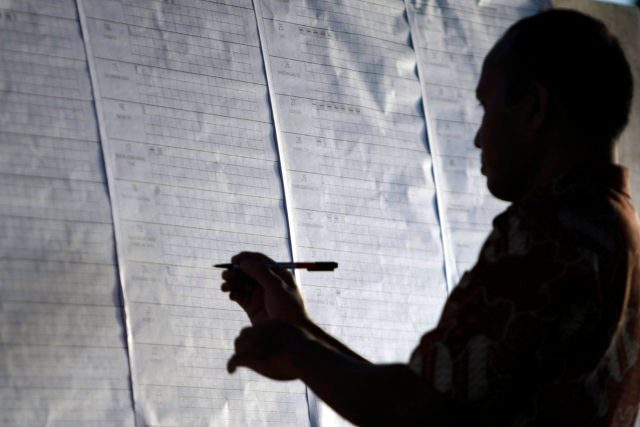SUMMARY
This is AI generated summarization, which may have errors. For context, always refer to the full article.

JAKARTA, Indonesia – Indonesia’s Muslim parties enjoyed a surprise jump in support at legislative elections this week, but analysts put it more down to anger with a corrupt ruling party than the growing popularity of political Islam.
Surveys had predicted that the 5 Islamic parties running at the polls in the world’s most populous Muslim-majority country would see their support slip further after years of decline.
While there have been increasing signs of Islam in Indonesian public life since the 1998 downfall of dictator Suharto – such as more women wearing the headscarf – Islamic-based parties saw their support wane.
But this picture unexpectedly changed at Wednesday’s polls. Combined support for the parties rose to 32% from 26% in 2009, according to an unofficial tally by the CSIS think-tank.
Some of the parties, such as the National Awakening Party (PKB) with more than nine percent, may now play important roles in forming a coalition after July presidential polls.
Analysts said much of the shift was due to the repeated failures of the secular parties to tackle endemic graft while in power, in particular the Democratic Party of President Susilo Bambang Yudhoyono.
“The failure to deliver clean government really does open the door to a pious message,” professor Jeffrey Winters, an Indonesia expert from Northwestern University in the United States, told the Agence France-Presse. (READ: Corruption, not Islam, key issue in Indonesia elections)
Secular governments have failed in the country “round after round”, he added.
Secular failure
This failure has been painfully clear in recent years as the party of Yudhoyono, who stormed to a second term in 2009 on a corruption-fighting platform, has been hit by repeated graft scandals.
The party saw its popularity halve to around 10% at the elections, and analysts believe many of its votes went to Islamic parties. The Democrats were only a fraction above the PKB, the best-performing Islamic party.
“The support for Islamic parties reflects the collapse of confidence in the ruling party,” said Jajat Burhanudin, an analyst at the Center for the Study of Islam and Society.
The unexpected success of Islamic parties was also helped by the Indonesian Democratic Party of Struggle (PDI-P), which led in opinion polls in the run-up to the vote, failing to do as well as predicted, analysts said.
The party came first with 19-20%, according to early results, but this was below expectations of around 25%. Some said the PDI-P had failed to capitalize on the popularity of its presidential candidate, Jakarta governor Joko Widodo.
Although the PKB did well, doubling its vote, analysts said this was as much to do with clever strategy as Islamic appeal. (READ: Indonesian elections: The heat is on)
The party attracted huge publicity by naming a popular singer, Rhoma Irama, as its candidate for president. While he is unlikely to be Indonesia’s next head of state, his star appeal nevertheless drew huge crowds to rallies.
The party also gained the coveted support of Nahdlatul Ulama (NU), the country’s biggest Muslim organisation with some 40 million members, and had the financial backing of Rusdi Kirana, the founder of fast-growing carrier Lion Air, who joined the PKB as its deputy chairman.
Even the Prosperous Justice Party (PKS), which was expected to suffer due to a scandal that saw its ex-president jailed, won 6.92 percent of the vote, not even one percent less than its peak in 2009.
Small differences
Despite all the attention focused on the fortunes of the country’s Islamic parties, some analysts said that nowadays they were not that different from the other parties, referred to as “secular nationalist”.
Secular parties also try to win Muslim votes — the PDI-P for instance has a religious wing — and vice versa, with some Islamic parties in recent years having sought to focus less publicly on religion and more on everyday concerns.
In his first week as an official presidential candidate last month, Widodo visited leaders from NU and Muhammadiyah, the second-largest Islamic organisation with some 30 million members.
“The lines have been blurred,” Noorhaidi Hasan, a lecturer on Islam and politics at Sunan Kalijaga Islamic University.
“Islamic parties know how to play up nationalism and nationalist parties also try to show they have religious interests. So people basically choose any party they like.”
And Muslim voters were looking for a party that could deliver more than just religion, said Greg Fealy, an Indonesia expert from Australian National University.
“Most Muslims are looking for good economic management, a stable government,” he said. – Rappler.com
Add a comment
How does this make you feel?
There are no comments yet. Add your comment to start the conversation.